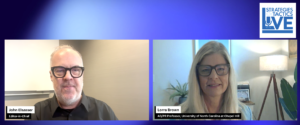
How this model can help you finetune your approach.
Whether you’re posting online, speaking at an event or presenting at a meeting, people are going to make assumptions about you.
“Everyone already has a brand,” Lorraine K. Lee, founder of RISE Learning Solutions and a founding editor at LinkedIn, said. “The question is whether you’re intentional about it or letting others define it for you. If you can be thoughtful about your career brand, it becomes a tool to help you grow, not just a buzzword.”
Lee, who will be speaking at Ragan’s Future of Communications Conference, developed a set of actionable principles as guidance. Her model is called the EPIC career brand framework.
EPIC stands for Experiences, Personality, Identity and Community, and Lee says it’s the roadmap for anyone who wants to go from “overlooked to unforgettable.”
Experiences: This is everything you’ve done professionally and personally that shapes who you are today. Think about roles you’ve held, projects you’ve led or challenges you’ve overcome. Highlight these experiences in stories, posts or work history. “Sharing challenges or lessons learned is powerful,” Lee said. “It helps people connect with you, see themselves in your story and understand what you stand for.”
Take time to reflect and list out key details that matter to the audience you’re trying to reach. This will help both your social media posts and speaking engagements feel more relatable, she said. “I used to say, ‘Hi, I lead editorial here (at LinkedIn).’ Later, I refined it to ‘I lead the editorial team collaborating with subject matter experts and influencers to create educational content for millions of users,’” she said. “That extra detail shows authority, mission and competence in 10 to 15 seconds.”
When people step back and think about their career journey, they often realize there’s a story that’s already there, she said. So show it. The way you promote these experiences in conversations, resumes and online profiles can define how someone thinks about you and your brand.
Personality: Your personality defines how people experience you. It’s what they’ll remember after a meeting ends, she said. Are you collaborative? Analytical? Energetic or calm under pressure? It’s crucial to be intentional about what you want others to see. “Your personality should match the traits you want associated with your career,” she said. For example, if you want to be known as a strategic thinker, demonstrate it consistently in meetings, presentations and content you share. “You can’t fake personality, though. It’s not about changing who you are but showing the parts of you that align with how you want to be known.”
Identity: Identity is about values, culture and what drives you. Lee points to her own identity and how that shaped her perspective and approach to leadership. “For me, part of my identity as an Asian American woman is bringing empathy and awareness into how I lead. I want others to see that their story and background are strengths, not things to hide,” she said. She encourages professionals to articulate the values they operate by, like integrity, reliability or relationship-building, and then show it in action. “It’s not just about saying your values; it’s about living them every day,” she said. “Your identity influences how you communicate, how you lead and how you make decisions. When you understand it, you show up more authentically.”
Community: Community ensures your brand is recognized and reinforced by others. “Even the strongest brand doesn’t exist in a vacuum,” Lee said. “Community is the most overlooked part of personal branding.” Peers, mentors and your network should see and validate the brand you’re trying to build. “You can have the best brand in the world, but if the people around you don’t see it or can’t vouch for it, it won’t have the impact you want,” Lee said. Credibility comes from others validating your reputation, she said. Ask for feedback when necessary and share goals with trusted colleagues, making sure your achievements and style are visible in speaking engagements, meetings and across social platforms.
EPIC is a continuous process and it’s important to adjust as you grow in a career, Lee said.
“You want your network to see you as you want to be seen,” she said. “If all four pieces align, your brand works for you instead of leaving it to chance.”
Register now to hear Lee’s session “The Visibility Factor: Showing Up, Standing Out, and Leading With Intent” during Ragan’s Future of Communications Conference, Nov. 12-14 at the Hyatt Regency in Austin, Texas.
Courtney Blackann is a communications reporter. Connect with her on LinkedIn or email her at courtneyb@ragan.com.
The post Growing a personal brand through the EPIC framework appeared first on PR Daily.














